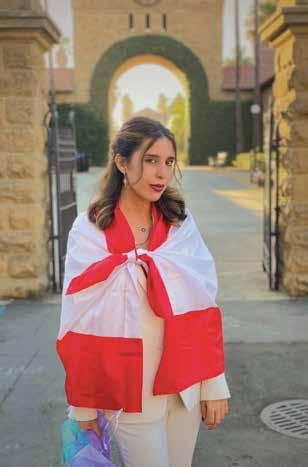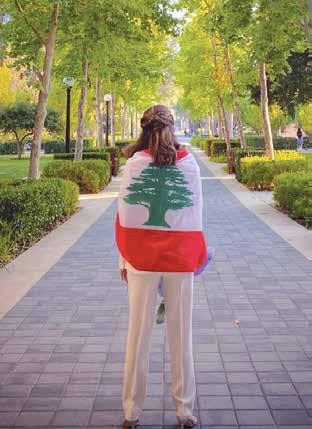
5 minute read
Young Alumni Spotlight: Tiffany Saade
Young Alumni Spotlight:
Tiffany Saade is going places - and is taking Lebanon with her.
On September 15th 2021, a young woman with the Lebanese flag tied around her shoulders stepped out onto the stage at Stanford’s famous Frost Amphitheatre. She reached the podium and smiled and waved to the sea of students, faculty, and staff below. For the next 15 minutes, the crowd listened, raptured, as she spoke candidly and passionately about the Beirut Blast, the current humanitarian crisis, and why it is important to keep talking about, and fighting for, Lebanon and its people.
It was not, as one might assume, an audience of 4,000 that made the Stanford University sophomore Tiffany Saade ‘20 nervous that day. “It was very stressful,” she stated. “Not because I had to speak in front of 4,000 people, I mean of course that was a factor, but because I am the only Lebanese in my class.”
Saade (who some may remember as the young author who published a poetry collection in her junior year at IC) is one of three Lebanese undergraduates at the university. “It was a pressure for me to uphold the name of Lebanon… Lebanese people rely on the diaspora to speak about the struggles that are happening back home. And with the media here in the US being very westernized and politically biased, it’s very important to have someone from the people speak for everything back home.”
At the end of her speech, the crowd erupted into applause. It was hugely successful - and the message clearly resonated with the Stanford community. “I would be just casually walking around campus and a lot of people stopped me to tell me that they loved the speech, but also that they want to know more. This is why we speak in public about these issues. People care, but people don’t know enough because the media makes it a trend. Talking about Lebanon is not a trend.”
A recent ‘frosh’ (freshman) herself, 18-year-old Tiffany was the youngest speaker of six selected by Stanford’s Faces program to address the incoming freshman class of 2025. The program seeks students with inspirational and impactful stories to share their experiences and to share what Stanford has meant to them.
Needless to say, Tiffany fit the bill. In August 2020, Tiffany’s life was uprooted not once, but twice. In the immediate wake of the Beirut blast, Tiffany travelled 11,718 km to begin a new chapter of her life in sunny California. She left behind her beloved family, friends, and city during a time of great turmoil to, as she states, “start writing the first paragraphs” of her chapter on her own.
However, at Stanford, Tiffany found a second home. “Stanford was a rejuvenation for me because I learned to be whole while missing a piece of myself.” The campus welcomed her with open arms and catalyzed her passions for international law, policymaking, and human rights, and sparked a desire to immerse herself as deeply as possible in all the university has to offer: “Even if we are not in Lebanon, it doesn’t mean that we are abandoning the country, it just means that we are moving forward in order to step back [to Lebanon] ... I’m trying to shape my education around this one question: ‘How can we give back to our country by piercing it all together again?’”
This is a heavy responsibility for an 18-year-old to bear; but if anyone is well equipped to tackle the question, it’s Tiffany. She has declared a major in Political Science with the primary track in political economy and development and a secondary track in justice and law, and a double-minor in International Relations and Human Rights, with a focus on comparative international governance and international security. Last year, she was one of ten freshmen elected to the Frosh council as a student representative, and she also wrote her own column for the school’s newspaper, the Stanford Daily. This past summer, she juggled three internships (don’t try this at home kids!): one as a research assistant at Stanford’s Immigration Policy Lab, another as a Reception and Placement Intern for the International Rescue Committee (IRC) in New York, and she began her own research on the political puzzle of Lebanon. This year, Tiffany was appointed to Stanford’s Board of Judicial Affairs, a 15-person standing committee of faculty, staff, and students (both undergraduate and graduate) charged with overseeing judicial processes related to the university’s internal affairs. It’s a big deal. Unsurprisingly, Tiffany is their youngest member. Oh, yeah, she’s also a research assistant for a guy named Francis Fukuyama - you may have heard of him. He’s a big deal. So it’s quite impressive that Tiffany is working with this internationally renowned political scientist and economist.

Despite her notable achievements at school, Lebanon remains her focus and driving force. During our 30-minute zoom call she continuously emphasized her love for her country and the importance of talking about, and fighting, for Lebanon.
Where does this drive, and hope, come from? She cites her experience in the Beirut blast and its aftermath, seeing the people put their country before themselves, “rebuilding Lebanon because they knew if they didn’t do it, nobody would. They sacrificed everything they had, even their moments to grieve and process their trauma, to rebuild their home. And that says a lot about the Lebanese people, but that doesn’t mean that we have to stay engulfed in this misery and all this trauma.” Despite everything, she proudly states that Lebanon has given her “a home, a language, heritage, family, memories,” which are all very much worth fighting for.
Her parting words: “I want to encourage everyone to keep talking about Lebanon. We shouldn’t use our privilege to run away from the situation, rather we should extend it to invest in and think about the question: how, in the position that I’m in, can I help Lebanon?” And it doesn’t mean you have to give a speech to 4,000 people. “It’s just by spreading the word.” she says.

